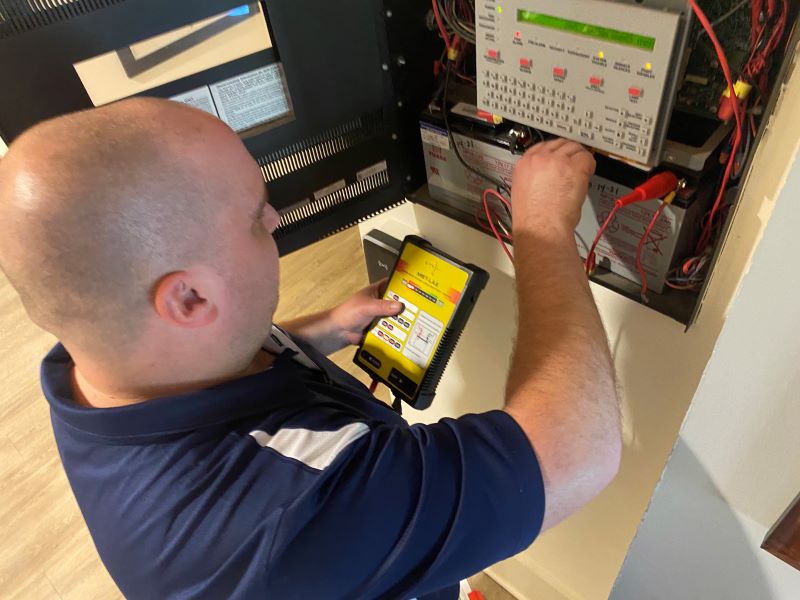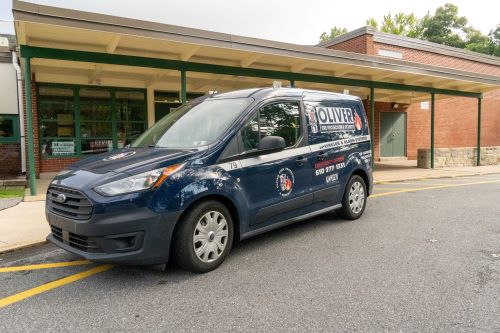Article by Brennan O’Donnell – Fire Alarm & Security Service Operations Supervisor
The safety of students and staff is a top priority for schools, and a major part of that is having effective fire alarm and sprinkler systems in place. But just having these systems isn’t enough—they need to be regularly inspected, properly maintained, and monitored 24/7 to truly protect everyone on campus. Here’s why these steps are so important and how they can make a big difference in keeping schools safe.
Fire Alarm Systems
Fire alarm systems are crucial for detecting smoke, heat, or flames and alerting people to evacuate quickly. In a school setting, where students and staff might not immediately realize there’s a fire, having a dependable fire alarm system is essential.

Why Regular Fire Alarm Inspections Matter
- Keeping Everything Working Properly: Fire alarm systems have various parts, like detectors, alarms, and control panels, which can lose their effectiveness over time due to dust, wear, or other issues. Regular inspections ensure that every part is working as it should, so the system remains reliable when it’s needed most.
- Meeting Safety Regulations: Schools must follow local, state, and federal fire safety regulations. Regular inspections help ensure compliance with these rules, avoiding potential fines and keeping everyone safe.
- Spotting Problems Early: Inspections help catch issues before they become serious. Problems like faulty wiring or malfunctioning detectors can be addressed during routine checks, preventing potential failures during an emergency.
- Providing Peace of Mind: Regular inspections give parents, staff, and students confidence that the school is committed to their safety. Knowing that the fire alarm system is in good shape is reassuring for everyone involved.
Fire Sprinkler Systems
Sprinkler systems play a key role in controlling or extinguishing fires before they can spread, helping to reduce damage and prevent injuries. Just like fire alarms, sprinklers need regular maintenance to function properly in an emergency.

Why Routine Sprinkler System Maintenance Is Crucial
- Ensuring It’s Ready When Needed: Sprinkler systems need to be properly maintained to work effectively. Regular checks make sure that sprinkler heads are clear, pipes are intact, and the system is charged and pressurized.
- Preventing Blockages and Corrosion: Over time, pipes can corrode or get blocked with debris, which can impact water flow. Routine maintenance helps catch and fix these issues before they compromise the system’s effectiveness.
- Staying Compliant and Insured: Just like fire alarms, sprinkler systems need to meet safety codes. Regular maintenance ensures compliance, which is important for insurance coverage and claims in case of a fire.
- Extending System Lifespan: Regular upkeep can help extend the life of the sprinkler system, avoiding costly repairs or replacements and keeping it reliable for years to come.
Monitoring These Systems
Monitoring takes fire safety a step further by providing real-time oversight of fire alarm and sprinkler systems. Here’s why it’s so important:

- Quick Response: When monitored, the sprinkler and fire alarm systems are connected to a central station that can detect alarms and other issues in real-time. In an emergency, the central station can immediately dispatch the fire department, ensuring a fast response to the situation.
- Around-the-Clock Supervision: Monitoring provides continuous surveillance of fire alarm and sprinkler systems, even outside regular school hours. This constant vigilance ensures that any issues are promptly addressed.
- Faster Emergency Dispatch: When a monitoring system detects a fire alarm, it quickly notifies emergency services, reducing response times and increasing the chances of effectively managing the fire before it gets worse.
- Reducing False Alarms: Alarm monitoring systems can help reduce false alarms through advanced filtering and verification processes, ensuring that emergency services are called only when necessary.
Routine Maintenance Tips
Fire Alarm Systems
- Regular Testing: Test alarms, check batteries, and make sure detectors respond correctly to smoke or heat.
- Cleaning and Servicing: Keep detectors clean to prevent false alarms and ensure they remain sensitive.
- Updating and Upgrading: Keep the system up to date with the latest technology.
- Training and Drills: Regularly train staff and students on evacuation procedures.
Fire Sprinkler Systems
- Monthly Inspections: Check for obstructions and signs of leakage or damage.
- Quarterly Testing: Ensure the system is pressurized and operates correctly.
- Annual Inspections: Have certified technicians perform a thorough inspection of pipes, fittings, and the overall system.
- Maintenance and Repairs: Address any issues, such as replacing damaged sprinkler heads or repairing leaks.
Creating a Comprehensive Safety Schedule
A solid maintenance and monitoring schedule is essential. Schools should work with certified professionals to develop a plan that includes:
- Monthly Checks: For visual inspections and basic functionality.
- Quarterly Tests: In-depth testing of system components.
- Annual Inspections: Comprehensive checks by certified technicians.
- Alarm Monitoring: Continuous oversight and prompt response from a central station.
Fire alarm and sprinkler system inspections, routine maintenance, and monitoring are more than just regulatory requirements—they are critical to protecting lives and property. For schools, where the safety of students and staff is of utmost importance, maintaining these systems and ensuring they are monitored 24/7 is a key responsibility. By staying on top of these practices, schools can create a safer environment and provide peace of mind to everyone involved. Remember, taking proactive steps today can help prevent tragedies tomorrow.

